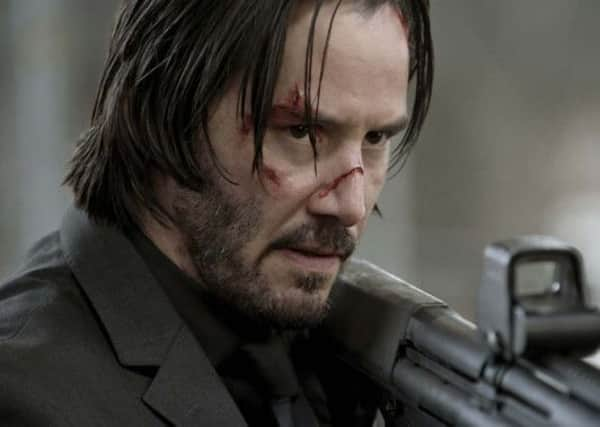Film reviews: John Wick | Cobain: Montage of Heck


John Wick (15)
Directed by: Chad Stahelski
Starring: Keanu Reeves, Michael Nvqvist, Alfie Allen, Willem Dafoe


Star rating: ****
In an age of superhero franchises in which the brand has become bigger than the star and anyone with a personal trainer can participate in elaborately choreographed fisticuffs, it’s easy to underestimate the value the right movie star can add to a film focussed on the primal thrill of seeing one-dimensional villains having their brains blown out at close quarters. Keanu Reeves is one such star and in the new revenge thriller John Wick he’s so good as a hollowed-out widower annihilating waves of Russian mobsters that he makes its tonally schizophrenic mix of artfully kill-crazy action and B-movie goofiness work in a way that it really shouldn’t.
Advertisement
Hide AdCast as the titular John Wick, a former assassin-for-hire with skills so deadly he once took out three guys with a pencil – “A f***ing pencil!” reiterates the teller of this particular legend – Reeves begins the movie in quiet, contemplative mood. Flash cuts quickly sketch out the depths of Wick’s personal despair at having recently lost his wife, Helen (Bridget Moynahan), to a never-specified illness: he rises early every morning and drifts through his minimalist home in a state of numbness from which the only relief comes with the shards of grief that cut through the sudden emptiness of his rehabilitated life. Anticipating this before her death, Helen had already arranged a parting gift to help him through these dark times: an adorable beagle puppy, Daisy, which arrives at his door one evening shortly after her funeral with a note informing him that he’s going to need something to love if he’s going to find any peace.
Dog lovers will be right to fear the worst with this arrival. Unlike last year’s Tom Hardy thriller The Drop, the film doesn’t have a particularly enlightened attitude to canine companionship. Daisy’s subsequent fate at the hands of a Russian gangster (Alfie Allen) – who kills her over a trivial altercation involving Wick’s vintage car – is an emotive plot device, a way to send Wick on his violent way in the full knowledge that audiences will be on board with whatever retribution he chooses to dispense having had the last living (and utterly adorable) connection to his wife cruelly taken from him. But the film is at least sensitive to this charge, dispensing with the dog’s death early and letting Wick’s fast-forged love for the pooch generate the sort of wrenching heartache that resonates through the remainder of the film.
It’s here that Reeves’s value really comes to the fore. As an actor he’s enigmatic in a way that’s hard to pin down, something that frequently makes him the target of bad-actor jibes. This is despite the fact that his unique talent for transforming blank-slate characters into whoa-inducing figures of action-movie awe has been repeatedly proven with the likes of Point Break, Speed and The Matrix. In less amped-up fare, like the nihilistic River’s Edge, the Bill and Ted movies, or Richard Linklater’s trippy Philip K Dick adaptation A Scanner Darkly, he also has a wonderful ability to be both otherworldly and completely in the moment. Even when it seems Reeves is doing very little, he’s attuned to his characters’ inner mysteries, which is why his best films prove so endlessly watchable and compelling.
As John Wick, all those qualities come into play. He moves through the film’s action sequences with the serenity of the dispossessed: his character has nothing to lose and nothing to fear; he takes no pleasure in killing and executes those who cross his path with brutal, eye-watering proficiency. It helps that director Chad Stahelski is a former stunt co-ordinator. He understands the balletic beauty movie violence can have and shoots the set-pieces with an elegance that understands the high-impact effect of letting hand-to-hand combat and bullet-and-brain-spraying bedlam unfurl in clearly choreographed sequences rather than trying to artificially replicate the kineticism of a real fight with jerky camera work and cut-to-shreds editing.
But if the action is artful and sophisticated, some of the plotting, the dialogue and the dismal Nu-metal soundtrack betray John Wick’s un-ironic B-movie aspirations. This is not some auteur-driven reinvention of a genre. Nor is it as deliriously or masterfully out-there as Adam Wingard’s crazy-good action mash-up The Guest last year. The characters in John Wick may inhabit a preposterous world in which nightclubs have neon-lit bathhouses in their basements and assassins their own hotel where they can bed down for the night without fear of reprisals from rival contract killers, but these feel like the sorts of scenarios Luc Besson might have cooked up for one of his myriad Europa productions.
Reeves, though, elevates it all. Gliding through the carnage in a three-piece suit, steely eyed and steel-fisted, he is, in short, most excellent.
Cobain: Montage Of Heck (15)
Directed by: Brett Morgen
Star rating: *****
Advertisement
Hide AdIt’s been 21 years since Nirvana frontman Kurt Cobain killed himself and one of the strangest things for those who came of age with Nirvana and felt proprietary about their music is how thoroughly the band has been mythologised and reduced to cliché-ridden signifiers of their times. That’s something Cobain: Montage of Heck seeks to counter. In a sprawling, swirling trawl through Cobain’s short life, director Brett Morgen utilises and reconfigures documentary conventions in ways true to Cobain’s creative process.
The title itself comes from a mix-tape that Cobain compiled in 1987. A mash-up of favourite songs, interspersed with audio montages of old TV recordings, vomiting and white noise, the abstract insight it provided into the tumult of Cobain’s hyperactive, hyper-creative brain is echoed by Morgen in the way he mixes up his wealth of interviews and archival footage, with music animations and journal confessions.
Advertisement
Hide AdWhat emerges is an intimate portrait of an artist mentally scarred early in his life by divorce and familial rejection, who carried that sense of shame and humiliation over into a career in which he desperately wanted success, but without relinquishing any artistic control of his work – an impossibility once his propensity for writing songs that combined killer hooks with the squalid primal noise that arose from deep within him propelled Nirvana to the top of the charts with the release of Smells Like Teen Spirit and the multi-million-selling Nevermind album. The film pointedly refuses to contextualise the band within the wider “Seattle scene” (the word “Grunge” is never uttered). Instead, it captures the disconnect that existed between the mainstream’s determination to co-opt and commodify Nirvana’s music and the band’s understandable desire to let their music and art speak for itself. Fuelled by mental illness, physical ailments and heroin abuse, the tragedy of Cobain is not romanticised and the drug use isn’t glossed over either: the most wrenching scenes feature a zonked-out Kurt, sores on face, attempting to play with his baby daughter Frances Bean (one of this film’s producers). There’s a Grey Gardens vibe to home movie footage of Kurt and wife Courtney Love, who comes off sympathetically, more because of her brutal honesty than any retrospective whitewashing of their relationship. A startlingly raw confession towards the end of the film certainly puts paid to any notions of this being hagiographic towards her or her late husband.
Though Cobain: Montage of Heck is unlikely to be the last word on the subject – the Nirvana legend is, ironically, far too lucrative now for that – it certainly deserves to be.
Good Kill (15)
Directed by: Andrew Niccol
Starring: Ethan Hawke, January Jones, Zoë Kravitz
Star rating: ***
Writer/director Andrew Niccol reteams with Gattaca star Ethan Hawke for this timely dramatic treatise on drone warfare. Hawke takes the lead as Major Tom Egan, a grounded fighter pilot reassigned to the so-called “chair-force” – where military personnel can fight the War on Terror from a backroom and get home to barbecue with the family after a full day blowing up foreigners in dusty countries. Niccol does a good job of depicting the desensitising banality of drone warfare and the psychological baggage that comes from engaging in combat with diminished physical threat, but he can’t resist reiterating these themes ad nauseam by frequently having Egan and his colleagues engage in didactic ethical debates about what they’re really doing.
Jauja (15)
Directed by: Lisandro Alonso
Starring: Viggo Mortensen, Ghita Nørby, Viilbjørk Malling Agger
Star rating: ***
In Jauja – it’s pronounced How-Huh, apparently – Viggo Mortensen plays a Danish military engineer whose job overseeing the establishment of the titular “promised land” for European settlers in 19th-century Patagonia is complicated by his 15-year-old daughter’s decision to run off with a young soldier. If that makes the film sound like a South American spin on John Ford’s The Searchers, it’s really not. Instead, his character’s subsequent efforts to track the girl down become a sort of existential quest, one that turns the film into an abstract Western in which the harsh but claustrophobic beauty of the landscape is intensified by the confines of Academy ratio framing – and larger questions about the legacy of colonialism are played out through strange encounters that lead Mortensen’s character further down the dreamy rabbit hole of a country he really doesn’t understand.
Lost River (15)
Directed by: Ryan Gosling
Starring: Christina Hendricks, Matt Smith, Ben Mendelsohn, Eva Mendes, Iain De Caestecker
Star rating: **
Advertisement
Hide AdRyan Gosling also seems determined to take audiences down a rabbit hole with his willfully indulgent directorial debut – a sort of Southern Gothic ruin-porn exploitation flick that hides its narrative incomprehensibility beneath an inch-deep layer of Lynchian obfuscation. Christina Hendricks leads a cast of previous Gosling co-stars as an impoverished single mother whose desperation to save her home from repossession leads to a job in a gore-infused cabaret show that doubles as a weird fetish club for its owner (Ben Mendelsohn), who seems to get off dancing in front of women encased in a bizarre plastic shell. Former Doctor Who star Matt Smith co-stars as Bully, a shaven-headed maniac with a penchant for stabbing rats and cutting the lips of henchmen, while Scotland’s own Iain De Caestecker also appears, inset. There’s some drivel, too, about an underwater town and a curse involving fake plastic dinosaur heads. What it all means is anyone’s guess. Gosling may craft the occasional moment of strange, demented beauty, but his reliance on dream logic and over-use of the sub-Terrence Malick-style imagery that has pervaded American indie cinema in recent years doesn’t convince.
Force Majeure (15)
Directed by: Ruben Östlund
Starring: Johannes Kuhnke, Lisa Loven Kongsli, Kristofer Hivju
Star rating: ****
Advertisement
Hide AdA husband’s cowardly response during an avalanche on a family skiing holiday is the catalyst for a lacerating satirical sideswipe at the male ego in Force Majeure. But Swedish director Ruben Östlund’s merciless and often very funny film doesn’t just ridicule its male protagonist, it interrogates what a fractious institution marriage can be when predicated on a societal pressure to conform to expected gender roles.